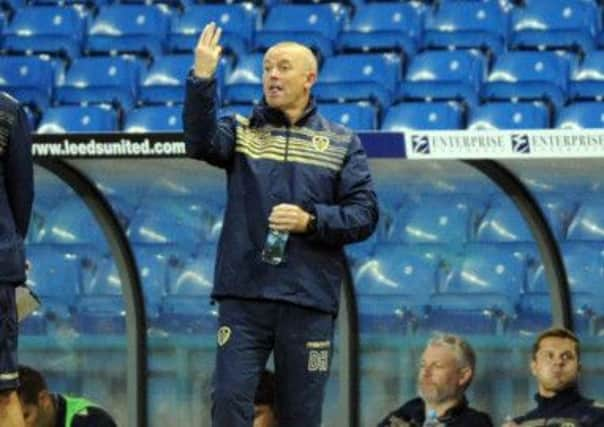Ins and outs: How Leeds’s eight managers have fared in the last decade


Whereas in the past, it was almost exclusively restricted to handing posts to either out-of-work managers, those in employment at another club or internal candidates, the rise of the foreign coach/manager – a relatively new phenomenon particularly at Football League clubs – is now increasingly entering the thoughts of those in the corridors of power more than ever.
For Leeds United owner Massimo Cellino, entrusted with appointing the club’s eighth full-time manager/head coach in the past decade, there remains plenty to ponder from his Miami base, with Neil Redfearn likely, for the short-term at least, to retain charge of first-team matters, starting with Saturday’s televised Championship clash at Birmingham City. Although as ever at United, things can be quickly change.
Advertisement
Hide AdAdvertisement
Hide AdAnalysis of managerial changes since the start of the 2013-14 season is striking for two trends, firstly the high number of appointments of individuals from foreign countries, seven of whom are playing their trade in the Championship in Felix Magath, Aitor Karanka, Ole Gunnar Solksjaer, Bob Peeters, Jose Riga, Sami Hyppia and Oscar Garcia.
The latter last week secured his second Championship position, at Watford following his earlier spell at Brighton – much to the frustration of Cellino, who had courted him strongly.
Secondly, the rise of the internal candidate accounted for a host of changes last term with Tim Sherwood, Garry Monk, Stuart Gray, Mark Warburton, Neil Adams, Andy Awford and Rune Meulensteen among a high number promoted from the inside.
Although just as interesting is the fact that several who fall into that category in Sherwood, Meulensteen, Mike Jackson and Graham Kavanagh have since been replaced.
Advertisement
Hide AdAdvertisement
Hide AdSecurity of tenure in the hot-seat at Elland Road over the past decade stands at 1.96 years – above the national managerial average at our 92 league clubs of 1.44 years and roughly on par with the average Championship life span of 1.93 years.
In the time since United were relegated from the Premier League, David Hockaday, Brian McDermott, Neil Warnock, Simon Grayson, Gary McAllister, Dennis Wise and Kevin Blackwell have taken on dug-out duties on a full-time basis, with Redfearn now in his third spell as caretaker-manager, a position also briefly filled by John Carver in the autumn of 2006.
Hockaday, Warnock, Grayson, McAllister and Blackwell saw their fates decided for them by way of sacking, with Wise leaving of his own accord and McDermott departing the club by mutual consent at the end of May,
Redfearn is firmly in the reckoning for the permanent position at Elland Road, with his current win percentage of fifty per cent, albeit from just six games in charge encompassing three different spells, the joint highest figure among those who have led United since they exited the top-flight.
Advertisement
Hide AdAdvertisement
Hide AdIt is level pegging with McAllister, whose fifty matches in charge yielded exactly 25 wins, just above the admirable level of 49.70 posted by Grayson in just over three years at United from Christmas 2008 to early in the New Year in 2012.
The former’s statistics were recorded exclusively in League One, with Grayson’s time roughly split between the third tier and the Championship, with his 169 games in charge taking in 84 victories, 45 losses and 40 draws.
Alongside promotion to the second-tier in his first full season in 2009-10, Grayson is also one of just two United managers to win a manager of the month gong since the club dropped out of the big time, lifting it for his exploits in December 2010 when Leeds’ fine winter form, inspired by the form of Robert Snodgrass, Jonny Howson, Max Gradel and Luciano Becchio, saw fans genuinely believe that a return to the Premier League Promised Land was on the cards. It hasn’t happened since.
Grayson, one of a host of names linked with the current top job at Leeds, was also shortlisted for the monthly award on five other occasions, including five times in 2009, in March, August, September, November and December.
Advertisement
Hide AdAdvertisement
Hide AdLike Grayson, Dennis Wise, appointed as Whites boss in October 2006 – with the Londoner surprisingly leaving to take up the position of executive director of football at Newcastle in January 2008 – could also look back on an impressive win percentage in the high forties at 47.47.
Wise, who left one match shy of recording a century of games in charge at United, chalked up 47 victories from his 99 matches at the helm, with the high point of his tenure arriving at the start of that infamous 2007-08 campaign when Leeds – controversially docked 15 points for failing to exit administration via a Company Voluntary Arrangement (CVA) – successfully adopted a siege mentality on and off the pitch to wipe out the deficit at the earliest available juncture.
All told, United won their first seven league matches in 2007-08 and didn’t drop any points that season until September 29 in a 1-1 draw at Gillingham, with a haul of seven consecutive league wins enough to see Wise win back-to-back monthly awards in August and September 2007.
Wise was also shortlisted the following month (October 2007), but left the club three months later when they were in fifth in the table – if it wasn’t for their 15-point penalty, United would have led the division by four points.
Advertisement
Hide AdAdvertisement
Hide AdWhile Wise left of his own volition, McDermott elected to leave with his position having long since been made untenable during a wretched second half of last season, both on and off the pitch.
It helped dragged his own win ratio down to 37.04 with only Hockaday (33.33) and Warnock (36.51) recording more inferior statistics among United’s eight permanent managers in the past 10 years.